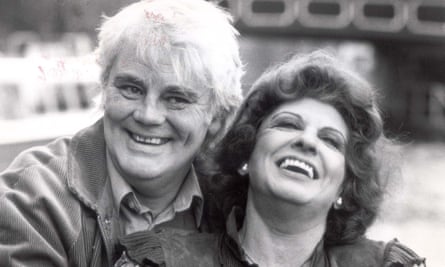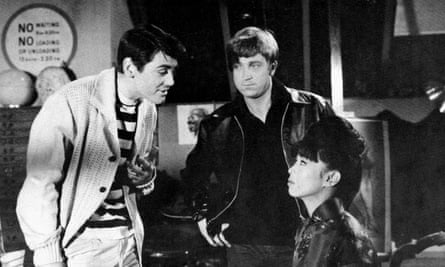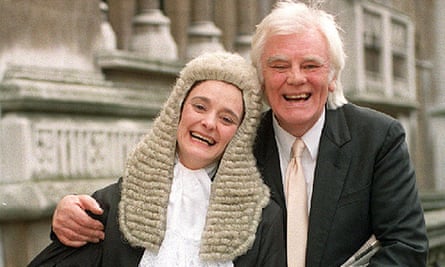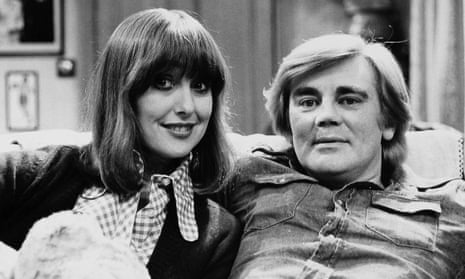Tony Booth, who has died aged 85, made his mark as an actor through personifying a particular British stereotype. This came through his part in the BBC sitcom Till Death Us Do Part (1966-75), written by Johnny Speight, in which he played the despised leftie “Scouse git” son-in-law of racist bigot Alf Garnett, played by Warren Mitchell. Booth’s character, Mike Rawlins, was a ne’er do well, not ill-natured but full of glib permissive cliches and doomed to make nothing of his life.
While Mitchell survived Alf to play other significant roles, Booth seemed to become trapped in the mould of irresponsibility. The public became more used to reading about his real-life misfortunes than watching him perform. And there were plenty of them. They included bankruptcy after his racehorse had failed to win, prosecutions for drunkenness and an incident when he set fire to himself at home.
Later on in life, he came to the nation’s attention again when his daughter Cherie Booth married Tony Blair, especially after the Blairs moved into 10 Downing Street. Red top newspapers delighted in pointing to ideological spats between Tony (Old Labour) Booth and Tony (New Labour) Blair.
Booth was born in a two-up, two-down in Jubilee Road, Liverpool. It was part of a long terrace occupied mainly by Catholics of Irish descent, and this was the background of his mother, Vera; his father, George, was a merchant seaman.
He was taught Latin from the age of six, as preparation for becoming a priest, in a nursing home run by nuns. He spent a year in Fazakerley hospital after being admitted for diphtheria, which he did not have, but which he had contracted, along with scarlet fever and mumps, by the time he was discharged. He read enthusiastically from the library.
His father was often out of work and forced into window-cleaning, until the second world war came and the demand for merchant ships improved. His maternal grandfather – who had been involved in the 1926 general strike and was blacklisted – inspired him towards socialism. His other grandfather was a pacifist, who eventually went into the army as a stretcher-bearer.

When he was 11, Tony went to St Mary’s college, Crosby, run by Christian Brothers, where he had to deliver newspapers to pay for his books. He emerged from poverty on the back of a profligate temperament and his acting talent. He spent 10 years in provincial rep, where he met the woman he maintained was the love of his life, the actor Pat Phoenix, who played Elsie Tanner in Coronation Street. She appeared in the play A Girl Called Sadie, based on the Somerset Maugham story Rain, as a prostitute; he as the young parson out to reform her.
They parted after three years, under the pressures of uneven employment. Many years later, he and Phoenix were reunited and remained together, she becoming his second wife shortly before her death from cancer in 1986. In the 1960s, he made cinema appearances in Mix Me a Person and The L-Shaped Room (both 1962), and in popular TV series such as Probation Officer, Z Cars, Dixon of Dock Green and The Avengers, along with three episodes of Coronation Street.
Booth had espoused old Labour long before Cherie married Blair. Through the 60s, he canvassed for the Labour party. It was after a Labour rally at Wembley that he met Speight, who told him of his plans for Till Death Us Do Part and asked him to play the cockney son-in-law of Alf. Booth suggested he change the character to a Liverpudlian, which he did.

Though he did not find a role to compare with it, he continued to work as an actor. He appeared as Sidney Noggett in Confessions of a Window Cleaner (1974) alongside Robin Askwith, followed by three more Confessions of ..., and in latter years showed up in such TV series as Heartbeat, Family Affairs, EastEnders, The Bill, Emmerdale and Holby City.
Booth first met Blair in 1979, and arranged a lunch for him with the MP Tom Pendry, at the Gay Hussar in London. Blair was persuaded to contest a byelection at Beaconsfield in Buckinghamshire in 1982, which he had no hope of winning. Booth canvassed for him a year later when he won Sedgefield in Durham. When Pat Phoenix died in 1986, Blair was with Cherie at the funeral.
Booth’s old Labour views and willingness to throw them at Blair sometimes attracted a sharper tongue than the future PM displayed in parliament. Once Booth persuaded one of his young daughters to ask Blair: “What will you do for pensioners like my daddy?” Blair replied: “For your father, euthanasia. For the rest, we’ll do the best we can.”

He gave free rein to his political views in his two autobiographies, Stroll On (1989, updated in 1997 as Labour of Love), and What’s Left? (2002). In 2004 he was diagnosed with Alzheimer’s disease and six years latter he suffered a stroke.
In 1954, he married the actor Gale Howard (nee Joyce Smith). They had two daughters, Cherie and Lyndsey, and later divorced. He had five daughters with partners whom he did not marry: with Julie Allan, Jenia and Bronwen; with Pamela Smith (the model Susie Riley), Lauren and Emma; and with Ann Gannon, Lucy. In 1988 he married Nancy Jaeger, and they had a daughter, Joanna. After their divorce, in 1998 he married his fourth wife, Stephanie Buckley, a Labour party worker.
He is survived by Stephanie and his eight daughters.
Anthony George Booth, actor, born 9 October 1931; died 25 September 2017

Comments (…)
Sign in or create your Guardian account to join the discussion